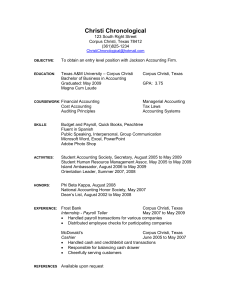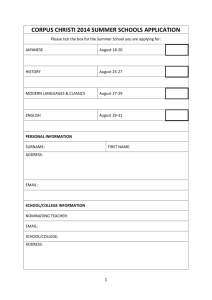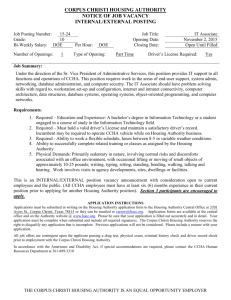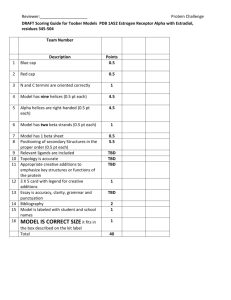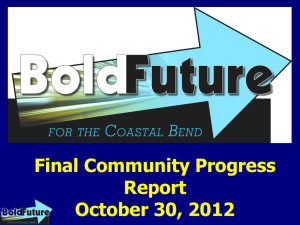Syllabus - College of Science and Technology
advertisement
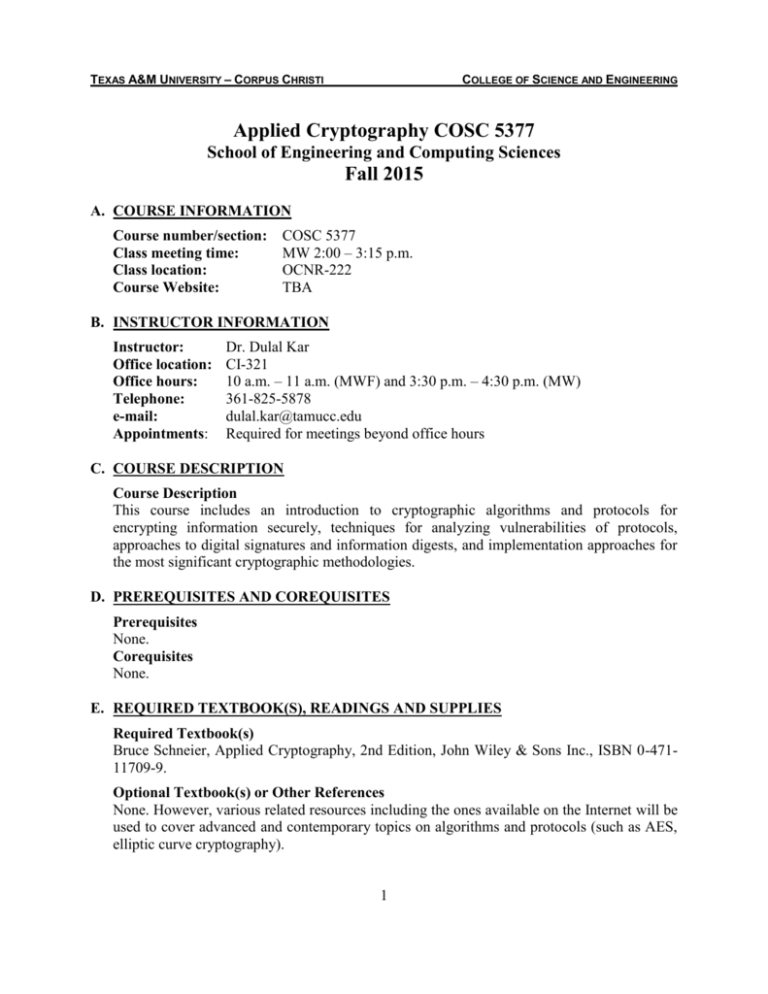
TEXAS A&M UNIVERSITY – CORPUS CHRISTI COLLEGE OF SCIENCE AND ENGINEERING Applied Cryptography COSC 5377 School of Engineering and Computing Sciences Fall 2015 A. COURSE INFORMATION Course number/section: Class meeting time: Class location: Course Website: COSC 5377 MW 2:00 – 3:15 p.m. OCNR-222 TBA B. INSTRUCTOR INFORMATION Instructor: Office location: Office hours: Telephone: e-mail: Appointments: Dr. Dulal Kar CI-321 10 a.m. – 11 a.m. (MWF) and 3:30 p.m. – 4:30 p.m. (MW) 361-825-5878 dulal.kar@tamucc.edu Required for meetings beyond office hours C. COURSE DESCRIPTION Course Description This course includes an introduction to cryptographic algorithms and protocols for encrypting information securely, techniques for analyzing vulnerabilities of protocols, approaches to digital signatures and information digests, and implementation approaches for the most significant cryptographic methodologies. D. PREREQUISITES AND COREQUISITES Prerequisites None. Corequisites None. E. REQUIRED TEXTBOOK(S), READINGS AND SUPPLIES Required Textbook(s) Bruce Schneier, Applied Cryptography, 2nd Edition, John Wiley & Sons Inc., ISBN 0-47111709-9. Optional Textbook(s) or Other References None. However, various related resources including the ones available on the Internet will be used to cover advanced and contemporary topics on algorithms and protocols (such as AES, elliptic curve cryptography). 1 TEXAS A&M UNIVERSITY – CORPUS CHRISTI COLLEGE OF SCIENCE AND ENGINEERING Supplies None. F. STUDENT LEARNING OUTCOMES AND ASSESSMENT Assessment is a process used by instructors to help improve learning. Assessment is essential for effective learning because it provides feedback to both students and instructors. A critical step in this process is making clear the course’s student learning outcomes that describe what students are expected to learn to be successful in the course. The student learning outcomes for this course are listed below. By collecting data and sharing it with students on how well they are accomplishing these learning outcomes students can more efficiently and effectively focus their learning efforts. This information can also help instructors identify challenging areas for students and adjust their teaching approach to facilitate learning. By the end of this course, students should be able to: 1. Identify and prioritize cryptographic issues 2. Analyze and describe specific cryptographic techniques 3. Identify, analyze, and counteract threats to cryptographic protocols 4. Define and analyze actual cases of cryptographic protocol failures 5. Understand and analyze digital cash protocols and mechanisms 6. Compare and contrast electronic voting protocols 7. Describe and analyze digital signature methodologies 8. Test cryptographic algorithms and protocols using open source tools G. INSTRUCTIONAL METHODS AND ACTIVITIES Instructions will be delivered through in-class lectures and presentations using slides. Students will be required to present their papers or projects in the class. H. MAJOR COURSE REQUIREMENTS AND GRADING Problem Sets. Problem sets will be assigned from the text as well as from other sources. Unix command based tools such as OpenSSL will be used for some of the assignments. For problem sets, you are allowed to discuss with other students in general terms, but you must not copy and submit someone's work as your own for credit. Some programming problems may be assigned; however, it depends on the background of the students in the class. Paper. This course requires that you write a technical paper related to cryptography. List of topics and relevant resources will be made available to the class later. The paper is due at the 2 TEXAS A&M UNIVERSITY – CORPUS CHRISTI COLLEGE OF SCIENCE AND ENGINEERING end of the semester. There will be a presentation session for all papers at the end of the semester on the final exam day as scheduled by the university. Exams. Two exams will be given. The first exam will be given on Wednesday, October 12, 2015. The second exam will be given on November 30, 2015. ACTIVITY % of FINAL GRADE Exams 60 Homework and Quizzes 25 Presentation 5 Paper 10 I. COURSE CONTENT/SCHEDULE DATE (BY DAY OR WEEK) 1 2 3 4 5 6 7 8 9 10 TOPIC CHAPTER(S) Cryptographic protocol fundamentals Communications using symmetric and public key cryptography Key exchange, timestamping, digital signatures, and bit commitment protocols Block ciphers: DES and AES Stream ciphers Key length and key management Cryptographic algorithm types and modes Zero-knowledge proofs, blind signatures, oblivious transfer, simultaneous contract signing Exam 1, October 12, 2015 Mathematical background for cryptographic algorithms Secure elections and digital cash One-way hash functions: MD5, SHA 3 Chapter 1 ASSIGNMENTS TBD TBD Chapter 2 TBD Chapters 3 and 4 Chapter 12 and online resource TBD TBD Chapters 7-9 TBD Chapter 6 Chapter 11 TBD Chapter 6 TBD Chapter 18 TBD TEXAS A&M UNIVERSITY – CORPUS CHRISTI 11 12 13 14 15 COLLEGE OF SCIENCE AND ENGINEERING Public-key algorithms: RSA algorithm and El-Gamal algorithm Digital signature algorithms, Key-exchange algorithms, Diffie-Hellman and Hughes protocols Elliptic curve cryptography, identity based encryption Special algorithms for protocols OpenSSL and other open source tools Final Exam, December 1, 2015 and Presentations Chapter 19 TBD Chapter 20 and Chapter 22 TBD Online resource TBD Online resource TBD Note: Changes in this course schedule may be necessary and will be announced to the class by the Instructor. The assignments and exams shown are directly related to the Student Learning Outcomes described in Section F. J. COURSE POLICIES Attendance/Tardiness You must attend all classes. You are responsible for any materials covered or handed out or announcements made for the tests, quizzes, and homework assignments in your absence. Records of your attendance will be maintained and reported to the university. Students found missing classes without the instructor's permission will be automatically withdrawn from the course. Students are responsible for all materials covered in class and assigned. Should a student be absent from class, it is his/her responsibility to get the notes, etc. for that missed class. More important, should there be assignments, it is the student’s responsibility to obtain such assignments. No excuse will be accepted for assignments not turned in because the student was absent when it was due. Late Work and Make-up Exams All the assignments are due at the beginning of the class on the due date. If the student is absent on the assignment due date, it is the student's responsibility to make sure that the assignment is submitted on the designated date. An assignment that is turned in after the class on the due date is considered one day late. There is a penalty for late submissions. Late assignments will be counted 20% off for each day after the due time. No credit will be given if an assignment is submitted after 5 days. If you have not completed your assignment by the due date, you should submit the work you have done for partial credit. No work will be accepted once the graded work has been returned or the solution has been disclosed to the class, except for unusual circumstances. Exams must be taken on 4 TEXAS A&M UNIVERSITY – CORPUS CHRISTI COLLEGE OF SCIENCE AND ENGINEERING the hour as scheduled. In the event, if you cannot attend the class to take the exam due to some emergency or some unavoidable situation (such as serious illness, death in the family, participation in university sports, religious observations, and so on) you must notify me as soon as possible before the exam and also you must validate your absence by providing me a document (e.g., with a letter from your doctor). Extra Credit None. Cell Phone Use Set your cell phone/electronic device in silent mode when you are in class. Laptop Use You can use your laptop to view course documents or slides. Food in Class Not allowed. Missed Exam No makeup exam will be given without prior agreement. Participation You are encouraged to ask questions related to course topics that can help you and others attending the class. K. COLLEGE AND UNIVERSITIY POLICIES Academic Integrity (University) University students are expected to conduct themselves in accordance with the highest standards of academic honesty. Academic misconduct for which a student is subject to penalty includes all forms of cheating, such as illicit possession of examinations or examination materials, falsification, forgery, complicity or plagiarism. (Plagiarism is the presentation of the work of another as one’s own work.) In this class, academic misconduct or complicity in an act of academic misconduct on an assignment or test will result in a failing grade. Classroom/Professional Behavior Texas A&M University-Corpus Christi, as an academic community, requires that each individual respect the needs of others to study and learn in a peaceful atmosphere. Under Article III of the Student Code of Conduct, classroom behavior that interferes with either 5 TEXAS A&M UNIVERSITY – CORPUS CHRISTI COLLEGE OF SCIENCE AND ENGINEERING (a) the instructor’s ability to conduct the class or (b) the ability of other students to profit from the instructional program may be considered a breach of the peace and is subject to disciplinary sanction outlined in article VII of the Student Code of Conduct. Students engaging in unacceptable behavior may be instructed to leave the classroom. This prohibition applies to all instructional forums, including classrooms, electronic classrooms, labs, discussion groups, field trips, etc. Statement of Civility Texas A&M University-Corpus Christi has a diverse student population that represents the population of the state. Our goal is to provide you with a high quality educational experience that is free from repression. You are responsible for following the rules of the University, city, state and federal government. We expect that you will behave in a manner that is dignified, respectful and courteous to all people, regardless of sex, ethnic/racial origin, religious background, sexual orientation or disability. Behaviors that infringe on the rights of another individual will not be tolerated. Deadline for Dropping a Course with a Grade of W (University) The grade of W will be assigned to any student officially dropping a course. Please consult with the instructor before you decide to drop to be sure it is the best thing to do. Just stopping attendance and participation WILL NOT automatically result in your being dropped from the class. Should dropping the course be the best course of action, visit the Office of the University Registrar for the Course Drop Form that must submitted. No student is eligible to receive a W without completing the official drop process by this deadline. Please consult the Academic Calendar (http://www.tamucc.edu/academics/calendar/) for the last day to drop a course. Grade Appeals (College of Science and Engineering) As stated in University Procedure 13.02.99.C2.01, Student Grade Appeal Procedures, a student who believes that he or she has not been held to appropriate academic standards as outlined in the class syllabus, equitable evaluation procedures, or appropriate grading, may appeal the final grade given in the course. The burden of proof is upon the student to demonstrate the appropriateness of the appeal. A student with a complaint about a grade is encouraged to first discuss the matter with the instructor. For complete details, including the responsibilities of the parties involved in the process and the number of days allowed for completing the steps in the process, see University Procedure 13.02.99.C2.01, Student Grade Appeal Procedures. These documents are accessible through the University Rules website at http://www.tamucc.edu/provost/university_rules/index.html, and the College of Science and Engineering Grade Appeals webpage at http://sci.tamucc.edu/students/GradeAppeal.html. For assistance and/or guidance in the grade appeal process, students may contact the chair or director of the appropriate department or school, the Office of the College of Science and Engineering Dean, or the Office of the Provost. Disability Services 6 TEXAS A&M UNIVERSITY – CORPUS CHRISTI COLLEGE OF SCIENCE AND ENGINEERING The Americans with Disabilities Act (ADA) is a federal anti-discrimination statute that provides comprehensive civil rights protection for persons with disabilities. Among other things, this legislation requires that all students with disabilities be guaranteed a learning environment that provides for reasonable accommodation of their disabilities. If you believe you have a disability requiring an accommodation, please call (361) 825-5816 or visit Disability Services in Corpus Christi Hall 116. If you are a returning veteran and are experiencing cognitive and/or physical access issues in the classroom or on campus, please contact the Disability Services office for assistance at (361) 825-5816. http://disabilityservices.tamucc.edu/ Statement of Academic Continuity In the event of an unforeseen adverse event, such as a major hurricane and classes could not be held on the campus of Texas A&M University–Corpus Christi; this course would continue through the use of Blackboard and/or email. In addition, the syllabus and class activities may be modified to allow continuation of the course. Ideally, University facilities (i.e., emails, web sites, and Blackboard) will be operational within two days of the closing of the physical campus. However, students need to make certain that the course instructor has a primary and a secondary means of contacting each student. L. OTHER INFORMATION Academic Advising The College of Science & Engineering requires that students meet with an Academic Advisor as soon as they are ready to declare a major. The Academic Advisor will set up a degree plan, which must be signed by the student, a faculty mentor, and the department chair. Meetings are by appointment only; advisors do not take walk-ins. Please call or stop by the Advising Center to check availability and schedule an appointment. The College’s Academic Advising Center is located in Center for Instruction 350 or can be reached at (361) 825-3928. GENERAL DISCLAIMER I reserve the right to modify the information, schedule, assignments, deadlines, and course policies in this syllabus if and when necessary. I will announce such changes in a timely manner during regularly scheduled lecture periods. 7
